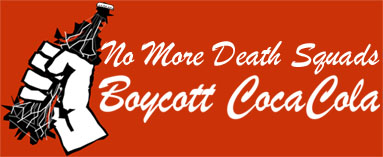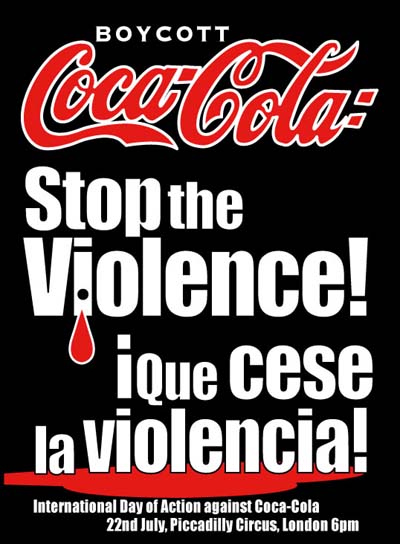
|
Coca-Cola
boycott launched after killings at Colombian plants Trade unions around the world have launched a boycott of Coca-Cola products, alleging that the company's locally owned bottlers in Colombia used illegal paramilitary groups to intimidate, threaten and kill its workers. The unions claim Coca-Cola bottlers hired far-right militias of the United Self Defence Forces of Colombia (AUC) to murder nine union members at Colombian bottling plants in the past 13 years. Two years ago, the Colombian food and drink union Sinaltrainal sued Coca-Cola and its Colombian bottling partners in a US federal court in Miami over the deaths of its members. The suit alleged that the bottling companies "contracted with or otherwise directed paramilitary security forces that utilised extreme violence and murdered, tortured, unlawfully detained or otherwise silenced trade union leaders", and that Coca-Cola was indirectly responsible for this. In March, the judge removed Coca-Cola from the suit, but the process against the bottlers continues. The unions have appealed against the court's decision. While the case continues, unions are calling on consumers to stop drinking Coke and other Coca-Cola products. The campaign was launched simultaneously in countries including the UK, US, Germany, Italy and Australia. Javier Correa, the president of Sinaltrainal, said the campaign aimed to put pressure on Coca-Cola "to mitigate the pain and suffering" that union members had suffered. Coca-Cola said in a statement on Tuesday that the allegations against the company and its partners were "completely false", and that the campaign was "nothing more than a shameless effort to generate publicity". But Mr Correa insisted that - despite increased international attention - actions against union members have continued. He said that in May, an anonymous caller to the union headquarters in Colombia warned that the offices would be targeted for a bomb attack. In March, a worker in the city of Bucaramanga received a notice from paramilitary groups that he had been declared a military target. While the plight of Colombia's Coca-Cola workers has become well-known overseas, local media were making no mention of the campaign yesterday. "In Colombia it is very difficult for this type of case to make it into local media," Mr Correa said. "It's all part of the culture of impunity." Sinaltrainal decided to seek international support after it became frustrated with the courts' delays in considering the deaths of its workers. "Cases that are 13 years old still have not been cleared up - no one has been detained and the cases end up unresolved," said Mr Correa. One of the union's accusations is that managers at a bottling plant in the town of Carepa in northern Colombia directed paramilitary fighters to kill two union leaders in 1994. Two years later a member of the union's executive board was killed at the plant by paramilitary gunmen, the lawsuit says. The latest death of a Sinaltrainal member happened last August, when Adolfo Munera was murdered in Caribbean coastal city of Barranquilla. A week earlier, the country's highest court had ordered the city's Coca-Cola bottler to re-employ him, after he was cleared of criminal charges filed against him in 1997 Coca Cola's Colombian bottlers have also denied the accusations. Colombia is the world's most dangerous country in which to be a union member, with 184 of the world's 213 confirmed killings last year, according to the International Confederation of Free Trade Unions.
The
Coca Cola Boycott Campaign Coca Cola and Nestlé both stand accused of serious human rights violations in Colombia. While Nestlé sack union members, Coca Cola kill them. Paramilitary Death Squads, acting under orders from Coca Cola management, have assassinated 8 trade union leaders in their workplaces. The union, SINTRAMINERCOL, has responded by calling for an international boycott of Coca Cola and all of their products, to start on 22 July.
The Coca Cola Genocide The incandescent red and white logo of Coca-Cola - the world’s fastest selling non-alcoholic beverage - has long secured its niche as the global mascot of The American Dream and the successes and happiness rendered by capitalism. Ongoing abuses suffered by Latin American Coca-Cola workers demonstrate that such success often comes at a terrible price. Specifically, the multinational has been riding on the back of Colombia’s dirty war on social protest –a war that has engendered the paramilitary’s hounding of food and beverage union SINALTRAINAL. The message behind the violence and threats of violence is always the same: “Dissolve the union or else…” This repression has helped Panamco S.A, Coca-Cola’s local franchisee, to drastically reduce their production costs by minimising salaries and firing over five-thousand workers whilst doubling their production, and their profits. The litany of abuses suffered at the hands of the paramilitaries includes the assassination of eight workers who were local leaders, three union members have been forced into exile, over sixty live under the shadow of death threats and some forty-eight others have been displaced. Union President Javier Correa describes conditions. "The paramilitaries have graffitied threats and accusations against us on the walls of the bottling plants. These plants have become like concentration camps. The army patrols the buildings. There is so much repression that union workers are even followed into the toilet. One worker killed himself. In his suicide note he blamed Coca-Cola.” And he explains the corporation's attitude: “Coca-Cola has turned from a time of exploitation to a time of slavery. Because the workers continue to resist this oppression the paramilitaries now try to kidnap family members, they’ve burnt union headquarters and destroyed whatever evidence they can so we are unable to bring a case against them. If SINALTRAINAL is dissolved," adds Correa "we face assassinations". William Mendoza is SINALTRAINAL branch President in Barrancameja
– an oil rich town at the epicentre of Colombia’s conflict.
The paramilitaries attempted to kidnap his daughter last year. Mendoza
describes SINALTRAINAL as “under siege… the Barrancameja
plant manager tells the paramilitaries that we are terrorists. We
have become military targets. Would-be union members at the Coca-Cola
plant now see joining SINALTRAINAL as like signing one’s own
death sentence.” So with help from the American Steelworkers Union, a federal court case has been put forward against Coca-Cola in the U.S. to gain reparation for the victims. Panamco has responded by taking SINALTRAINAL to the Colombian courts – renowned for corruption - with charges of calumny. Failed and abused by both the Colombian system and Coca-Cola, SINALTRAINAL has turned to the people and the international community to explain their crisis. Since July last year three International Public Hearings have taken place, the first in Atlanta in July, the second in Brussels in October and the final one in Bogotá on 5th December 2002. These hearings were a formidable expression of resistance. The aim? To denounce and combat the devastating effects of terrorism: both by the Colombian state and by the multinational companies. All those who took part in the hearings have pledged to campaign,
consolidate the solidarity network and endeavour to start breaking
the colossal Coca-Cola culture. “The obstacles are big”,
acknowledges Pedro Marecha, the union’s defiant lawyer, “but
we will overcome them.”
Meg Willams
Boycott Coca Cola Update 22 July 2003 NEWS FROM BOGOTA, TOTNES AND AROUND THE WORLD Speaking from Colombia's capital city Bogota last night, Javier
Luis Correa president of the food and drinks workers union Sinaltrainal
said:
Boycott Coca Cola UK Launch 22 July 2003 The International Day of Action to launch the boycott of Coca Cola
was taken up by a number of groups with at least seven protest actions
across the country, with news of more still coming in. Earlier in the day a group from the Cardiff Anarchist Network took
direct action. They entered Coke bottling and distribution plant
in Edmonton, north London. One of the protesters locked himself
to a lorry, some locked the plant's gates while others pressed emergency
buttons to stop the production line. During the two hour production
stoppage for the emergency services to arrive the protesters meantime
talked to workers inside the plant to explain their action. And
the paramedic who arrived to assist the protester locked to a lorry
turned out to be a representative of public sector union UNISON
and was completely supportive. The protesters were detained by police,
but released after Coca Cola decided not to press the charge of
'conspiracy to commit burglary'. One protester overheard Coke managers
saying over the police radio that £30,000 worth of output
had been lost.
Further Information
|
||||||||


